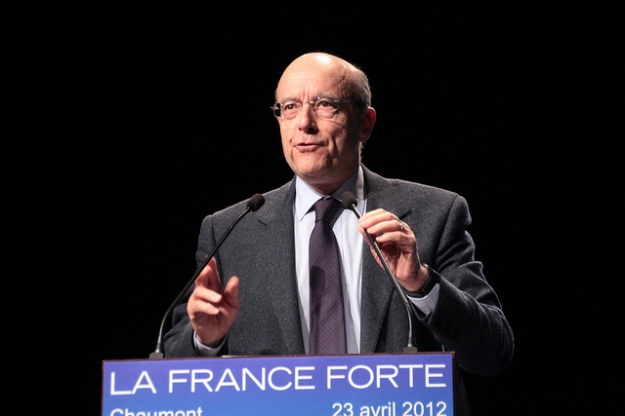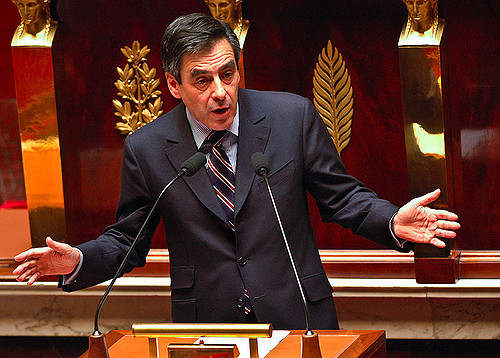On both sides of the Atlantic, you can feel the political winds shifting. Growing from breeze to bluster, they carry the hints of a long-forgotten stench in the West. After Brexit and Trump, they’re on to France, where it’s almost certain that the far-right populist Marine Le Pen will qualify for the second round of the country’s two-step presidential election next May.
What remains less clear is her victory. Most French pundits and polls reach the same conclusion: François Hollande’s successor will come from the country’s main right-wing party, the recently renamed Les Républicains (LR), or the Republicans. That’s because France’s two-round system offers a chance for voters of all stripes to gang up against the National Front should it perform well. In 2012, Le Pen’s father infamously advanced to the second round of the presidential election only to be trounced by the incumbent Jacques Chirac.
Much of the 2017 campaign has yet to play out. Independent left populist Jean-Luc Mélenchon hopes to make a surprise appearance in the second round. So too do the Socialists. But with the ruling party in tatters thanks to Hollande’s historic unpopularity, signs suggest the task of uniting voters against Le Pen will fall to the Republicans.
Under these circumstances France’s first-ever right-wing primary has taken on outsized importance. Just around 3 million voters are expected to participate in a country of 66 million and determine, in one way or another, the country’s next president. On Sunday, they head to the polls. If one of the seven candidates doesn’t win an outright majority in the first round – a near-certainty – then the top two vote getters will square off the following Sunday, November 27. The contest is open to all registered voters willing to shell out two euros and sign a pledge in support of the “values of the center and the right.”
One central question looms over it all: Who is best equipped to defeat Marine Le Pen next spring? And a corollary: Should the “mainstream” presidential campaign of the right seek to emulate or reject Le Pen’s politics?
Here’s a guide to the candidates, listed according to their current position in the polls.
Alain Juppé: Juppé is the odds-on favorite to win the primary – and the presidency in 2017. The current mayor of Bordeaux has a long and distinguished political career. He served as foreign affairs minister under François Mitterand in the 1980s, prime minister under Jacques Chirac, briefly led Les Républicains when the party went by another name and held three different ministerial roles under Nicolas Sarkozy governments. A graduate of the prestigious École Nationale d’Administration (ENA) – a kind of factory for the country’s ruling class – Juppé is the preferred candidate of the “establishment,” or les élites, as the French say. Resolutely pro-European Union, the 71 year old mayor has positioned himself as a moderate and the only one capable of unifying the country and rescuing it from its malaise. “I’m the only one who can comfortably beat Le Pen,” he said in September. Recent Polls: 33%, 40%, 39%, 37%

Juppé, the great unifier? (Creative Commons, Flickr user: UMP Photos, April 23, 2012)
Nicolas Sarkozy: After his 2012 defeat to Hollande, the former President promised to retire from politics for good. Instead Sarko is back – and with more chutzpah than ever before. The former Interior Minister has always had a knack for playing up “law and order,” but this time it’s his central focus. Like Le Pen, identity and security rule the day. In September, Sarkozy declared that as soon as one becomes French, “one’s ancestors are the Gauls” – a preposterous talking point lifted from 19th century nationalists. He’s also expressed support for outright banning Muslim headscarves from public space. Sarko is nevertheless projected to make it to a run-off against Juppé. “The choice of the American people must be heard,” he said following the election of Trump. “It expresses a desire for change and the refusal of a one-track way of thinking.” Recent Polls: 30%, 26%, 27%, 31%

Sarko 2.0 (Creative Commons, Flickr user: European People’s Party, February 18, 2016)
François Fillon: Sarkozy’s former Prime Minister turned rival has criticized Juppé for being too “moderate” and the former President for focusing on distracting social issues. Offering first-hand criticism of Sarkozy’s style of governance, Fillon promises to combine tough security policies with neoliberal economic reforms like the elimination of 500,000 public sector jobs. He risks being crowded out despite a late surge in the polls. Recent Polls: 20%, 15%, 15%, 12%

Fillon in his more youthful days at the National Assembly (Creative Commons, Flickr user: Magali, September 16, 2008)
Bruno Le Maire: Le Maire is perhaps the most U.S.-style Republican of the Republicans, mixing social conservatism with aggressively free market policies. Le Maire championed the unsuccessful fight against gay marriage and now calls for sweeping reforms of France’s generous safety net including the privatization of the national employment office. Recent Polls: 8%, 13%, 11%, 11%

Congressman, I mean, Deputy Le Maire, (R-L’Eure) (Creative Commons, Flickr User: Fondapol, April 4, 2016)
Nathalie Kosciusko-Morizet: The only woman in the race, NKM has struggled to find her place. A pro-business social liberal in the U.S. mold, the deputy representing Parisian suburbs would fit right in with Blue Dog Democrats. But just two years after coming up short in the French capital’s mayoral race, she once again appears doomed. Recent Polls: 3%, 4%, 5%, 3%
Jean-François Copé: The former president of the party just before its Republican rebrand, Copé is haunted by the pain au chocolat affair. Asked to estimate the price of the popular chocolate-filled pastry in an October radio interview, Copé guessed between 10 and 15 cents. In fact, it’s closer to one euro. Recent Polls: 4%, 1%, 1%, 3%
Jean-Frédéric Poisson: A parliamentarian and president of the tiny Christian Democratic Party, Poisson is an old-school Catholic right-winger who might have been a monarchist in a previous generation. His last name, which literally means “fish,” makes for excellent puns. Recent Polls: 2%, 1%, 2%, 3%

Cole, so glad for you that you are able to be out of the country for this Trump fiasco to enjoy your work in a place that you seem to love. Thanks for the French political update!